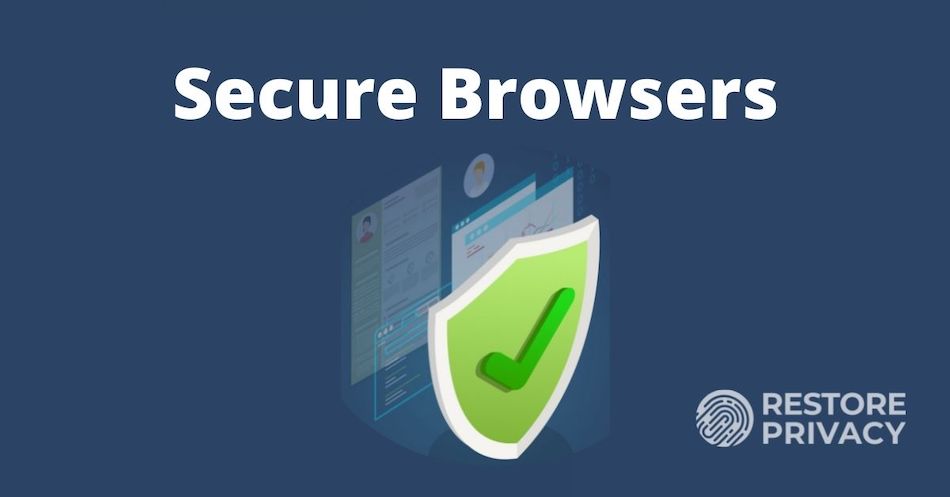
A secure browser that protects your privacy is a critical tool for staying safe online and keeping your data secure from third parties. We have been reviewing, testing, and ranking browsers for the past six years and this guide contains the latest recommendations for 2024.
Do you want a secure browser that truly keeps your data private? Well, you may be surprised by how much of your data is actually getting exposed.
WARNING: Many browsers today are actually data collection tools for advertising companies. This is the case for Google Chrome, the largest and most popular browser. By collecting data through your browser, these companies can make money through their advertising partners with targeted ads. We see this same privacy-abusing business model with search engines, email services, and even free mobile apps.
Unless properly configured, most browsers contain lots of private information that can be exploited – or simply collected – by various third parties:
- Browsing history: all the websites you visit
- Login credentials: usernames and passwords
- Cookies and trackers: these are placed on your browser by the sites you visit
- Autofill information: names, addresses, phone numbers, etc.
And as we will explain further below, using “private” or “incognito” browsing will not protect you. Your IP address will remain exposed and various third parties can still track all of your activities. And even legal action may not protect you. Here is a recent headline related to a lawsuit against Google for capturing data from users who are in Incognito mode. This case has been going on for years now and isn’t close to resolution yet.

And even with a locked-down and hardened browser, exploits may still be found that expose your data and possibly your identity. For example, in 2021 there was a spate of zero-day exploits in Google Chrome with various effects up to allowing hackers to remotely execute code on affected systems. We discuss some other privacy issues (and solutions) in our guides on browser fingerprinting and also WebRTC leaks.
But don’t panic. Effective solutions and tools exist to deal with these problems and we cover them in detail in this article. In this browser security and privacy guide, we’re going to explain the following topics:
- Best secure browsers that respect your privacy
- Problems with other browsers
- Browser privacy compartmentalization
- Secure browser add-ons
- “Private browsing” mode is NOT very private (and why you need a VPN in addition to a secure browser)
Incognito / Private browsing mode still leaves you EXPOSED
When using “private” or “incognito” browsing mode in your browser, your real IP address and location are still being revealed to every website, ad, and tracker that loads in your browser. Additionally, all your activities remain visible to your internet service provider (ISP). And at least here in the United States, ISPs log everything you do online and share the data with many other parties. This is why it’s critical to use a good VPN for basic digital privacy.
The best way to achieve true privacy while hiding your real IP address and online activities is to use a secure browser together with a good VPN. This protects you at both ends of the line, and in the middle too.
The secure browser will protect you as described in this article, while the VPN will protect your identity by hiding your real IP address and location. The VPN will also encrypt your traffic so your ISP (and any other snoops out there) cannot see your activities online. Here are our top three recommendations from the best VPN list that we have tested and reviewed:
- NordVPN: A fast, secure, audited VPN with advanced privacy features, built-in ad blocker, and a strict no-logs policy, based in Panama (see the 74% off coupon).
- Surfshark VPN: A no-logs VPN service with a large lineup of privacy and security features, based in The Netherlands.
- ExpressVPN – This is a secure and reliable VPN that boasts some great privacy features and also works well for streaming. It is based in the British Virgin Islands.
Now let’s examine the most secure browsers you can combine with a VPN for maximum privacy.
Secure browsers that protect your privacy
In this section we will examine the best browsers based on two main factors:
- Security: How well does the browser protect you from hackers, vulnerabilities, and online exploits?
- Privacy: How much data is the browser itself collecting about you and who is this data being shared with? How does the browser protect your privacy?
Conflicting opinions! Just like with Tor, opinions about browser privacy and security can be wildly divergent and contentious.
This guide is not meant to sell everyone on one browser that beats all others. Rather, it is a summary of information about different web browsers that do well with both privacy and security. Choose the best browser for you based on your own unique needs and threat model.
Here are the most secure and private browsers for 2024:
1. Brave: The most secure and private browser (for both desktop and mobile)

Brave is arguably the most secure browser with simple, out-of-the-box privacy. It is a Chromium-based browser that is fast, secure, and privacy-focused by default. It has a built-in ad blocker and browser fingerprinting protection, while also giving you access to numerous add-ons and extensions. The main developer behind Brave is Brandon Eich, who formerly worked for Mozilla.
To summarize this browser, Brave is based on open-source Chromium, but configured for more privacy. It does well with its default privacy settings and extra features. Here is a brief overview:
- Blocks ads and trackers by default
- Protects against browser fingerprinting and even offers fingerprint randomization
- Built-in script blocker
- Blocks all third-party storage
- Easy access to the Tor network
One of the reasons we like Brave is because it offers simple, out-of-the-box privacy by default. This makes it ideal for those who do not have the time, patience, or know-how for browser customizations and tinkering. Brave can also be used with Chrome extensions, making it an ideal alternative for Chrome. Just download it and you’re good to go.
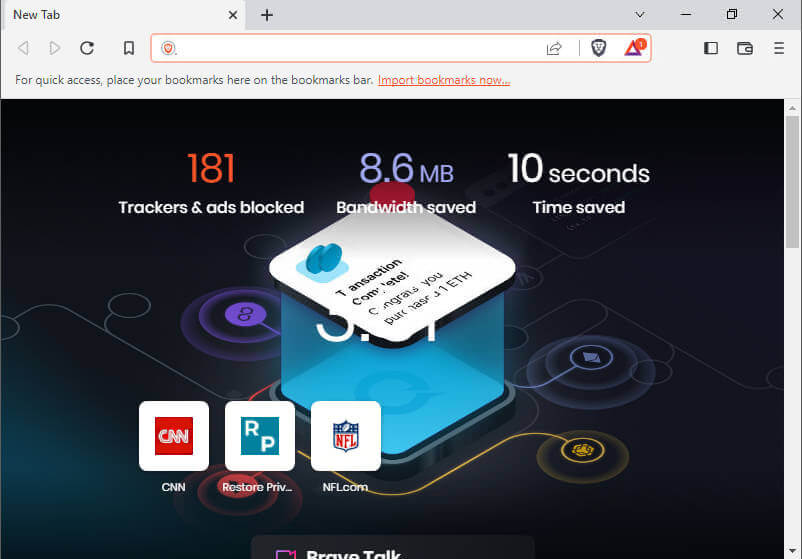
Tor network – Brave also has a feature that allows you to access the Dark web by simply opening a new window with Tor. We discuss this feature in our guide on how to access the Dark web safely.
Ads – Brave has received some criticism for its ads program, which allows users to “view non-invasive ads without compromising your privacy.” While some people find it hypocritical that a privacy-focused browser has its own ad program, we also see it as a secure funding source. And with many browsers financially struggling, it appears that Brave’s business model is securing this browser’s future and ability to continue to innovate its products.
Here are some more results of Brave’s continuing innovation:
- Brave has developed a private search engine called Brave Search, which is now the default search engine when you do a new installation of the Brave browser. In March of 2023, they added the AI-powered Summarizer to Brave Search.
- A cookie consent blocker, which at least partly frees you from the endless hassle of accepting or rejecting cookies at new sites you visit.
- Brave News, an RSS news reader.
- Brave Wallet, a built-in cryptocurrency wallet.
You can read more about Brave’s privacy features here.
https://brave.com
2. Firefox (when modified and tweaked for privacy)

Firefox is a great all-around browser for privacy and security. It offers strong privacy protection features, many customization options, excellent security, and regular updates with an active development team. The newest versions of Firefox are fast and lightweight with many privacy customization options.
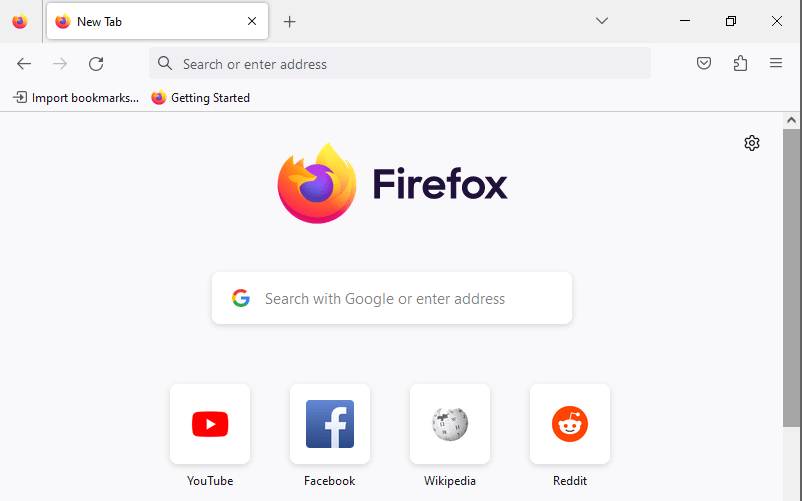
Out of the box, Firefox is not the best for privacy, but it can be customized and hardened, and we show you exactly how in our Firefox privacy modifications guide. Be sure to disable telemetry in Firefox, which is a feature that will collect “technical and interaction data” and also “install and run studies” within your browser.
Within the Privacy & Security settings area, there are many useful customization options for different levels of privacy: Standard, Strict, or Custom.
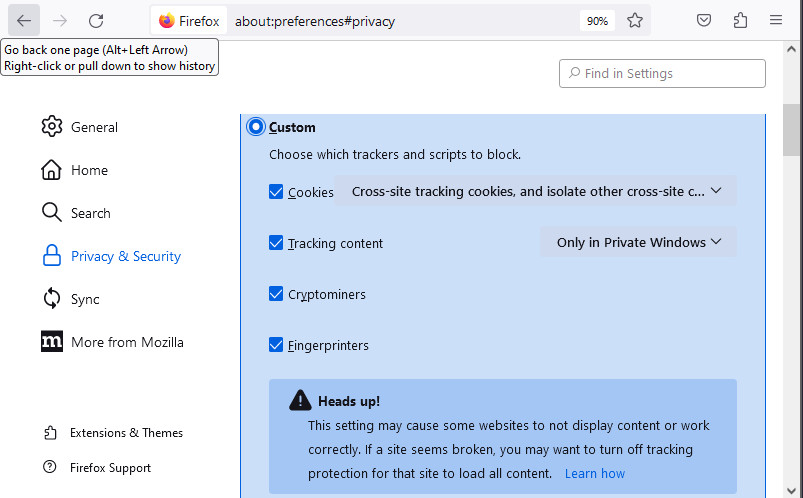
Another great benefit of Firefox is the ability to use numerous browser extensions that can enhance your privacy and security. We’ll go over some of these extensions later in this article.
Firefox highlights:
- Open source code that has been independently audited
- Active development with frequent updates
- Excellent privacy features and customization options
- Total Cookie Protection (TCP) to prevent cookies from tracking you as you move around the web
- Firefox View to easily return to recently used sites
- Built-in ad blocker
- Many browser extensions supported
- Telemetry and tracking need to be manually disabled
- Other modifications necessary for extra privacy and security
If you want to keep using older add-ons that are no longer supported by the latest Firefox release, you can go with the Firefox Extended Support Release (ESR). For those times when you want the maximum privacy viewing content on your Android phone, you could try Firefox Focus.
For additional customization and privacy settings, check out our Firefox privacy guide.
https://www.mozilla.org/firefox
3. Tor browser

Next up we have the Tor browser. The Tor browser is a hardened version of Firefox that is configured to run on the Tor network. By default, the Tor Browser is a secure browser that protects you against browser fingerprinting, but it also has some disadvantages.
Because it uses the Tor network, which routes traffic over three different hops, download speeds with the Tor browser can be quite slow. The default version may also break some sites due to script blocking. Finally, there are drawbacks to the Tor network itself. These include:
- Malicious/dangerous exit nodes
- High latency
- Many websites block IP addresses originating from the Tor network
- Dependence on US government financing, leading some to claim the Tor network to be fundamentally compromised
See the pros and cons of Tor here.
Another option is to use the Tor browser with the Tor network disabled. In this sense, the Tor browser will work like the other secure and private browsers we’ve covered above. Additionally, you can simply run a VPN in the background. Like the Tor network, a VPN will also encrypt your traffic and hide your IP, but it will be much faster.
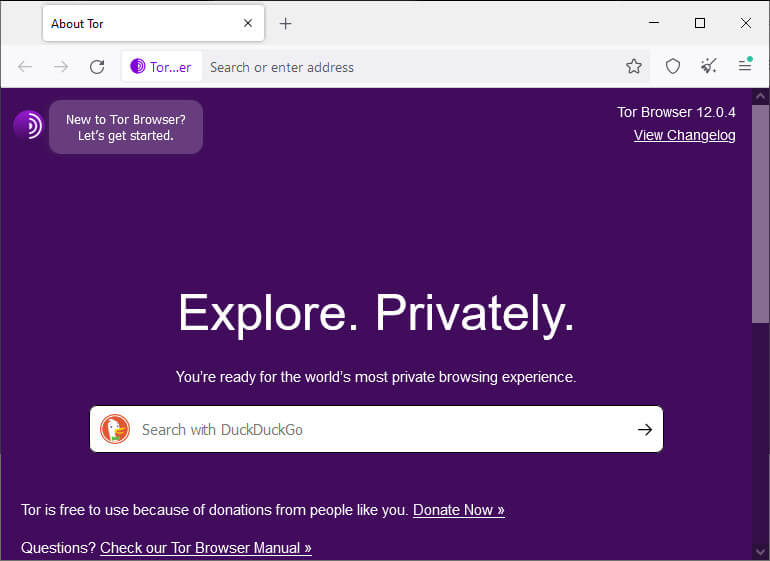
There’s a new browser out there that takes exactly this approach. It is a collaboration between Mullvad and the Tor project, and you can learn more about it in spot #6 on this list.
Be careful when adjusting the settings for the Tor browser, however, as this may compromise the browser’s built-in privacy and security features.
https://www.torproject.org/
4. Ungoogled Chromium browser

Ungoogled Chromium is an open source project to provide a Chromium browser, without the Google privacy issues:
ungoogled-chromium is Google Chromium, sans dependency on Google web services. It also features some tweaks to enhance privacy, control, and transparency (almost all of which require manual activation or enabling).
ungoogled-chromium retains the default Chromium experience as closely as possible. Unlike other Chromium forks that have their own visions of a web browser, ungoogled-chromium is essentially a drop-in replacement for Chromium.
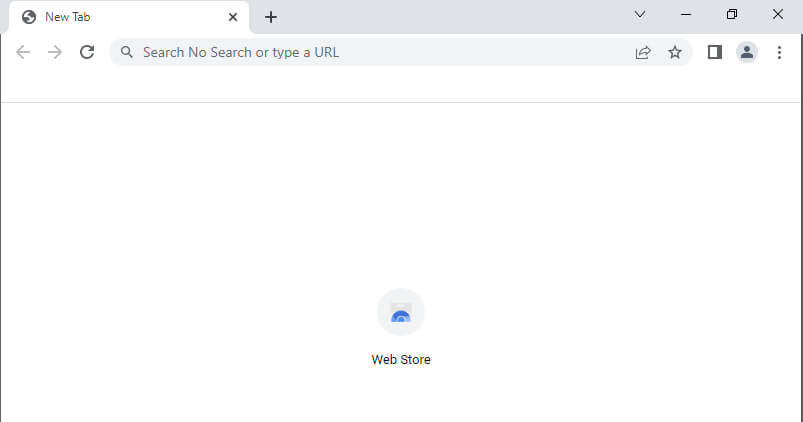
UPDATE: Support for Ungoogled-Chromium has continued, but it has moved from its original github archive to the new archive linked below. It does require some technical skills to download this browser from the archives.
https://github.com/ungoogled-software/ungoogled-chromium
5. LibreWolf – A private and secure fork of Firefox

LibreWolf is a fork of Firefox that continues to grow in popularity. The project’s stated goals are to deliver a browser that is focused on privacy, security, and freedom. From the LibreWolf website:
LibreWolf is designed to increase protection against tracking and fingerprinting techniques, while also including a few security improvements. This is achieved through our privacy and security oriented settings and patches. LibreWolf also aims to remove all the telemetry, data collection and annoyances, as well as disabling anti-freedom features like DRM.
The website lists the main features of LibreWolf as:
- No Telemetry
- Private Search
- uBlock Origin pre-installed
- Enhanced Privacy
- Fast Updates
- Open Source code
LibreWolf is available for desktop operating systems, including Windows, Mac OS, Linux, and Open BSD. You can find installation instructions here.
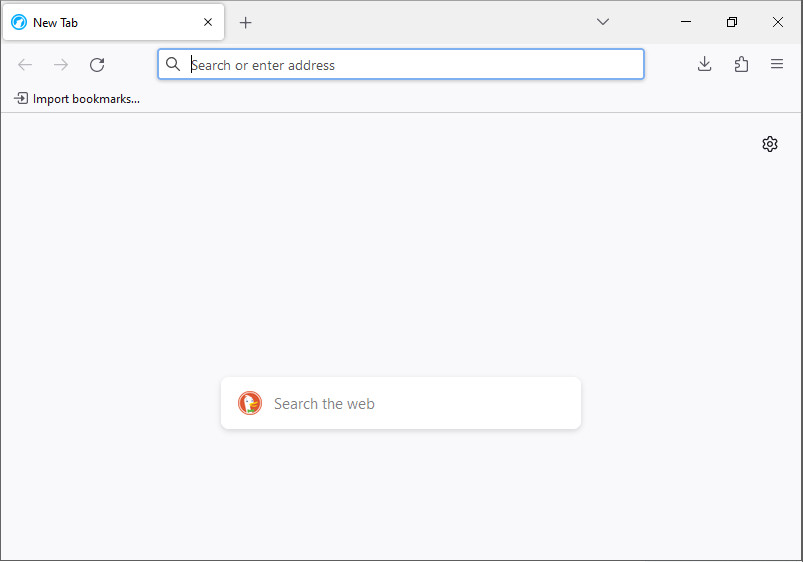
One issue to keep in mind, however, is that there are no automatic updates. This means that you will need to manually update the browser, which is certainly a drawback to consider. Fortunately, LibreWolf frequently pushes these browser updates to the relevant archive managers, making it easier to update than it would otherwise be.
LibreWolf is always based on the latest version of Firefox. Updates usually come within three days from each upstream stable release, at times even the same day. Unless problems arise, we always try to release often and in a timely manner.
– LibreWolf FAQ section
This is definitely a browser to consider for those wanting more privacy and security on desktop operating systems.
https://librewolf.net/
6. Mullvad Browser – A privacy collaboration between Mullvad and Tor

When we talked about the Tor browser earlier in this article, we suggested using the Tor browser with the Tor network disabled and a quality VPN might be a better way to go than using the Tor network. We’re not the only people who feel this way. The Mullvad Browser is designed to do exactly this.
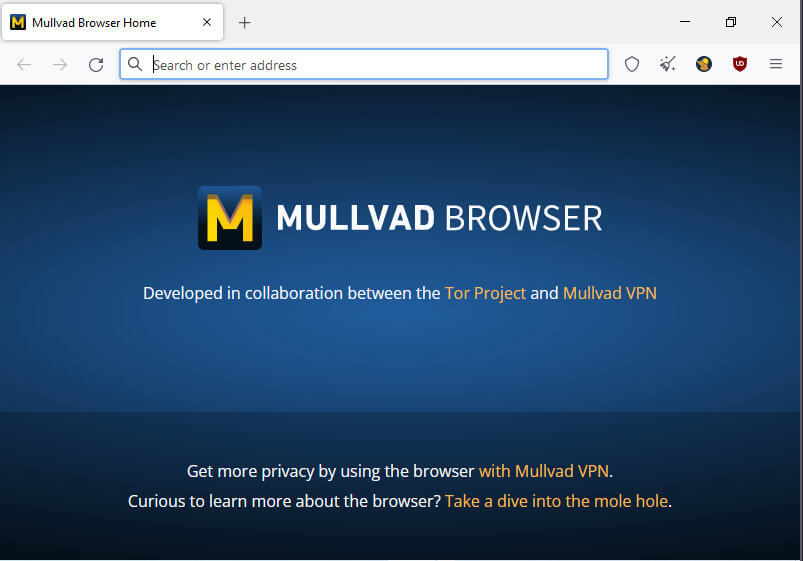
This privacy-focused web browser is a joint project between Mullvad VPN and the Tor Project. It incorporates the privacy benefits of the Tor browser such as tracker blocking and fingerprinting. But the Mullvad Browser isn’t designed to connect to the Tor network.
Instead of going through the Tor network, the Mullvad Browser is meant to be connected to the internet through a quality VPN. Obviously, the folks at Mullvad would love for you to use their browser with their VPN, but you don’t have to. In the image below I am using the Mullvad Browser to view this website through NordVPN.
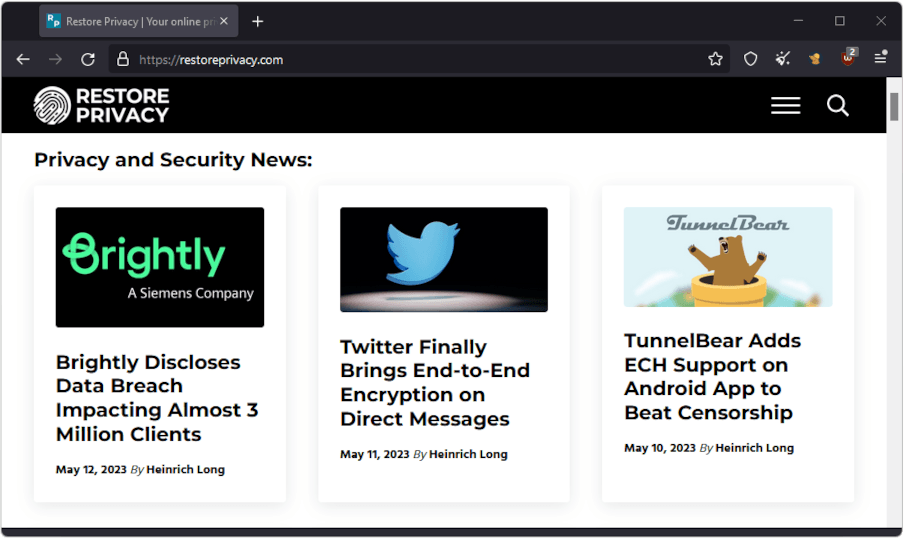
This browser collaboration definitely has potential. To learn more about it, check out our recent article on this Mullvad – Tor project.
https://mullvad.net/en/browser
7. DuckDuckGo private browser (macOS, iOS, and Android)

The DuckDuckGo private browser is available for macOS as well as mobile devices running iOS or Android. It comes with lots of privacy-focused features by default. According to DuckDuckGo, their browser offers:
- Built-in tracking protection
- Encryption upgrades via Smarter Encryption technology
- Easy data management and clearing options
- Fast speeds
Issues with Microsoft trackers
One important thing to be aware of is that security researchers previously discovered that DuckDuckGo’s browser allowed Microsoft trackers. According to DuckDuckGo founder Gabriel Weinberg, this decision was based on a “confidential” agreement between DuckDuckGo and Microsoft.
Many people in the privacy community were outraged when the situation first came to light on Twitter here. There was clearly an element of hypocrisy going on here as we see DuckDuckGo castigate Google over the same practices. But last year, DuckDuckGo announced that they had reached an agreement to block Microsoft trackers.
Should you use DuckDuckGo’s privacy browser? I’d recommend that you consider some of the alternatives we recommend in this guide. That said, the changes DuckDuckGo has made to block the Microsoft trackers makes us much more comfortable with this browser. Ultimately, the choice is yours.
The DuckDuckGo private browser is available on both the Google Play and Apple stores.
8. Waterfox
Waterfox is a fork of Firefox that was maintained by just one person for many years. In February 2020, news broke that the developer of Waterfox sold out to a pay-per-click ad company called System1. However, in July 2023, news broke that Waterfox is once again independent:
I am happy to say that Waterfox is independent again. This change allows the community and myself to shape the browser’s future direction.
Waterfox Blog
Putting all that aside, Waterfox is a great option for those wanting Firefox with out-of-the-box privacy.
Waterfox website >>
Private browsers worth mentioning (but not necessarily recommended)
Here are a few private and secure browsers that didn’t make our recommended list but we think are still worth mentioning.
9. Bromite (Android)
Bromite is a Chromium-based browser for Android only (no desktop support). It comes with some great features by default, including ad blocking and various privacy enhancements.
Unfortunately, being a small project, Bromite suffers from infrequent updates. The last update was apparently in 2020!
Here are some highlights of this browser from the official Bromite website:
- The main goal is to provide a no-clutter browsing experience without privacy-invasive features and with the addition of a fast ad-blocking engine.
- Minimal UI changes are applied to help curbing the idea of “browser as an advertisement platform”.
- All patches are published under GNU/GPL v3 to enable other open source projects’ usage.
- Bromite is only available for Android Lollipop (v5.0, API level 21) and above.
Another cool feature I like with Bromite is that you can use custom ad block filters — learn more here. Bromite is under active development and remains a great browser for Android users.
https://www.bromite.org/
10. Pale Moon
Pale Moon is another open-source fork of Firefox, which aims for efficiency and customization. In testing out Pale Moon, it does offer different customization options, as well as support for older Firefox add-ons and its own lineup of add-ons. The design feels a bit dated, but it’s also not overly-cluttered and is lightweight and fast. Even more importantly, this secure browser is still being updated
Pale Moon is currently available on Windows and Linux, with other operating systems in development. Unlike other Firefox forks, Pale Moon runs on its own browser engine, Goanna, which is a fork of Gecko (used by Firefox). This is an older engine that was previously used by Firefox, but has long since been replaced. Many argue that this older codebase is a security vulnerability. And it’s also worth noting that the development team is very small compared to more popular browsers.
Pale Moon website >>
11. GNU IceCat
GNU IceCat is a fork of Firefox from the GNU free software project. IceCat is entirely “free software” as defined here and also includes various privacy add-ons and tweaks by default. Here are the privacy-protection features listed on the IceCat page:
- LibreJS
- HTTPS-Everywhere
- SpyBlock
- AboutIceCat
- Fingerprinting countermeasures
No updates – The big issue with GNU IceCat is that there do not appear to have been any updates since 2019. This can expose IceCat users to security vulnerabilities, which is why we are no longer recommending it.
GNU IceCat website >>
12. Iridium
Like Brave, Iridium is a secure browser that is based on Chromium and configured for more privacy by default. The following excerpt from Iridium’s website provides a good overview of this secure browser:
Iridium Browser is based on the Chromium code base. All modifications enhance the privacy of the user and make sure that the latest and best secure technologies are used. Automatic transmission of partial queries, keywords and metrics to central services is prevented and only occurs with the approval of the user. In addition, all our builds are reproducible and modifications are auditable, setting the project ahead of other secure browser providers.
Iridium is still being updated pretty frequently. However, it is not a widely-used browser, and there is no support for Android, iOS, or any other mobile devices.
Iridium browser website >>
Issues with other popular browsers
While some browsers claim to be secure against vulnerabilities, they might not be the best choice from a privacy perspective.
1. Google Chrome
Google Chrome is by far the most popular browser. Unfortunately, it’s a data collection tool as well and not a good choice for anyone looking for privacy.
You can safely assume that everything you do through Google Chrome is collected, saved to your data profile, and used for targeted advertising.
2. Microsoft Internet Explorer/Edge
Edge is a Microsoft product.
Just like with Windows, it’s a good idea to avoid Microsoft products, including the discontinued Internet Explorer and its replacement, called Edge. Both those browsers are closed-source, so there’s no telling what’s going on behind the scenes, and they’re also not the best for privacy reasons.
3. Opera browser
Opera started off as a decent browser, developed in Norway. However, in 2016 it was sold to a Chinese consortium for $600 million – and a lot has changed. The following information from Opera’s privacy policy explained how user data was collected and shared when you used Opera products. This was enough to turn us off to this browser:
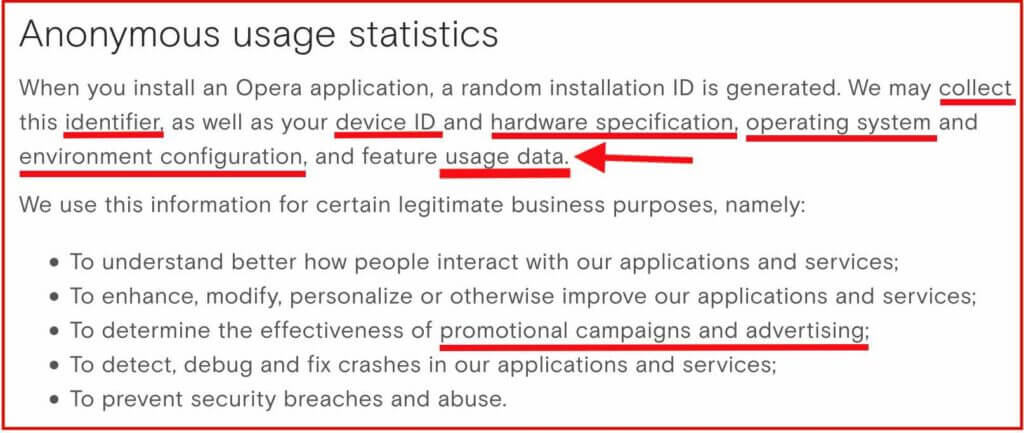
Opera also claims to offer a free VPN through the browser. However, as we covered in the Opera VPN review, it’s not really a VPN and does not offer full system-wide encryption. Additionally, your data is being collected when you use Opera browser and its “free VPN” feature.
4. Epic browser
Epic is a browser based on Chromium, created by “Hidden Reflex” which is based in India. Since 2014, Epic has been claiming they would open source the code, but it remains closed source today. What’s going on behind the scenes? How do they manage Chromium and remove invasive code? Who knows.
Just like with Opera VPN, Epic falsely claims to offer a “free VPN” through the browser, but this is not really true. The browser is merely routing traffic through a US proxy server. As we learned with Opera (and with many other “free proxy” services), proxies are often used for data collection (and they are often not secure). When reading the Epic privacy policy, we find that data from “video download and proxy services” is being collected.
One person who analyzed Epic found it to be connecting to Google on startup. This suggests that Epic is not, in fact, de-googled as it claims.
There are many better Chromium-based browsers to consider.
5. Safari browser
Safari is the default browser for macOS and iOS devices. Overall, Safari is not a horrible choice in terms of privacy and tracking protection – but it also cannot be recommended for a few reasons:
- Apple is a partner in the PRISM surveillance program
- Apple was caught “hoarding” Safari browsing history – even after it was deleted
- Apple was found to be collecting Safari history even when used in private mode
On a positive note, however, Apple does somewhat better with privacy than other large companies. The Safari browser blocks third-party cookies by default and also implements cross-site tracking protection.
6. Vivaldi browser
Vivaldi is a Chromium-based browser with source-code modifications that can be seen here. It is less popular than other browsers, with less active development than Firefox, for example.
Reading through their Privacy Policy, I did find some concerning information about data collection and the use of unique IDs:
When you install Vivaldi browser (“Vivaldi”), each installation profile is assigned a unique user ID that is stored on your computer. Vivaldi will send a message using HTTPS directly to our servers located in Iceland every 24 hours containing this ID, version, cpu architecture, screen resolution and time since last message. We anonymize the IP address of Vivaldi users by removing the last octet of the IP address from your Vivaldi client then we store the resolved approximate location after using a local geoip lookup. The purpose of this collection is to determine the total number of active users and their geographical distribution.
You can read more about Vivaldi here.
Secure and private browsers on mobile devices
Many of the recommended browsers above also offer versions for mobile users on iOS and Android.
With that being said, here are some good options for mobile users:
- Brave
- Bromite
- Firefox Focus
- DuckDuckGo
I also like using standard Firefox on mobile devices with customization and configurations for more privacy.
Browser privacy and compartmentalization
One problem that often comes with browser privacy and security is that people want to remain logged in to various accounts, while also browsing the web. But this is problematic. When you stay logged in to Gmail or Facebook, for example, their trackers can record your activity as you browse the web.
One potential solution to this problem is browser compartmentalization. This is when you use different web browsers for different online activities. For example:
- Browser #1 will only be used for accessing your online accounts that require a password. You can stay logged in with only this browser, and it won’t be used for general browsing.
- Browser #2 will only be used for web browsing, with various privacy configurations and no cookies or history being stored on the browser.
- Browser #3 could be completely locked down for maximum privacy and security.
You can also utilize different browsers, configured exactly the way you want, for various purposes, depending on your needs and threat model. The key is to keep the compartmentalization strict and not break the rules/uses for each browser.
Virtual machines – On the topic of compartmentalization, using virtual machines is also a good idea for both privacy and security. You can easily run Linux VMs through VirtualBox (FOSS) on your host computer.
Password managers – It should also be noted that storing your passwords in the browser may be risky depending on the browser you are using, especially since browsers may store passwords in cleartext. A better alternative would be to utilize a secure password manager. We have reviewed many popular options, including Bitwarden, Dashlane, LastPass, and more.
Browser add-ons for security and privacy
In addition to adjusting the settings within your browser, there are also a number of different add-ons or extensions you can install to improve your browser’s privacy and security.
Here are a few different options, but they may not all be supported by the browser you are using:
- uBlock Origin – This is one of the best browser-based ad blockers available that will also protect you against tracking.
- Cookie Autodelete – This will automatically delete cookies that are no longer needed from your browser.
- NoScript – NoScript allows you to customize exactly which scripts run on the websites you visit. Like uMatrix, this is for advanced users and requires lots of customization.
Warning: Be cautious about using third-party add-ons and browser extensions. There are many Chrome VPN extensions that are 100% free, but also very dangerous. Do your research first, since add-ons and extensions could function as spyware and data collection tools for third parties. This is especially true with free VPN services or browser proxy add-ons from questionable sources.
“Private” or “Incognito” browsing mode is NOT private (and why you need a VPN)
Many people falsely assume that using “private” or “incognito” mode in a browser actually provides some privacy. This is a false assumption.
Using “private” browsing mode only stops your browser from storing cookies, history, and passwords. But it doesn’t actually make you any more “private” to the outside world. Even when browsing in “private” or “incognito” mode, you are still exposed:
- Your internet provider can still see every site you visit. And note that internet providers are now forced to log web browsing activity of their customers and provide this data to authorities on request in many countries. In the United States, ISPs log everything and share the data with a huge network of third parties.
- Your real IP address and location remain exposed to all sites, ads, and trackers. This makes tracking and identification easy since your device has a unique IP address linked back to your identity through your internet service provider.
To easily solve these problems, we strongly recommend using a good VPN service. Using a VPN is simple. You just need to sign up for a VPN subscription, download the VPN app for your device, then connect to a VPN server and browse the web as normal. This offers many benefits:
- A VPN will securely encrypt your internet traffic, which prevents your ISP from seeing what you do online. (Your ISP will only see encrypted data, but not what you’re actually up to.)
- When you connect to a VPN server, the VPN server’s IP address and location will replace your real IP address and location. This allows you to appear to be anywhere in the world.
- A VPN will also allow you to access geo-restricted content, such as streaming Netflix with a VPN from anywhere in the world.

Below is a brief overview of our recommended VPNs. They have each come out on top in our testing for the respective VPN reviews.
- NordVPN: A fast, secure, audited VPN with advanced privacy features and a strict no-logs policy, based in Panama (with a 74% off coupon). See our NordVPN review here.
- Surfshark VPN: A no-logs VPN service with a large lineup of privacy and security features, based in The Netherlands. See the Surfshark VPN review.
- ExpressVPN – A fast, reliable, and secure VPN that also works well for streaming, but with above-average prices. See the ExpressVPN review for the pros and cons.
Short on money? There are also some good cheap VPNs that offer excellent features and performance, without breaking the bank. We also have detailed VPN comparisons. Our ExpressVPN vs NordVPN guide compares the top two providers.
Conclusion: Secure browsers and privacy in 2024
A well-configured secure browser is crucial for protecting your data if you want to browse the web with kind of privacy. But there are several good, secure browsers to choose from. So how do you do it?
Finding the best secure browser for you comes down to identifying the one that best fits your unique needs. Since this is a personal decision with subjective criteria, we can’t recommend a single option that is best for all use cases.
In truth, you need more than a secure browser that is configured to protect your privacy. To that browser you should add a quality VPN that will encrypt your traffic and hide your IP address.
You should also consider using a good ad blocker. Many ads include tracking code that companies can use to collect your browsing data and serve you targeted ads. If you aren’t blocking ads, your activities can be tracked by third-party advertising networks, which is not at all ideal.
Note: There are some VPNs that have built-in features to block ads and trackers. See our guide on VPN ad blocking for more info.
In terms of privacy, you may also want to protect yourself against browser or device fingerprinting and WebRTC browser leaks, which can expose your identity even when using a good VPN service.
This secure browser guide was last updated on May 15, 2024.

Thanks @Bronco I already have Brave configured as you suggest, it is other settings I am specifically referring to. I will give it another couple of days to see than go to Brave Forums if the problem is persisting.
I understand that a really good Firefox/Gecko fork is not easy because of the code that Firefox uses but it really sucks that all the new browsers are all Chromium based browsers. Google wants to shove Chrome in everyone’s face. Currently, I am using Ghostery Dawn…it is decent but by no means great browser, the add blocker is weak ansd the “big problem” with Ungoogled Chromium & LibreWolf is their lack of of auto updating. Are there any other browsers out there that are not Brave, that are worth looking into (must have auto updating)?
@Tina Ma’am few other browsers worth checking out are Epic privacy browser, Vivaldi browser which you will definitely like, Opera browser and Avast Secure Browser. Some other browsers are Puffin Browser which is paid and Maxthon Browser.
@Tina it may actually be that Mozilla does that purposely and making Gecko source code complex by design. Consequently, browser developers drift to Chromium source code. That is largely why I dumped Firefox for Brave.
Hi RP Community,
I am having an issue with Brave on Windows 11.
When I go into > settings > shields, for the options “Trackers & ads blocking,” and “Block fingerprinting” I set these to “Aggressive” and “Strict, may break websites.” The problem is that when I completely close Brave and then relaunch the app in the settings for both these options default back to “Standard.” So basically Brave is not saving my settings. I note this is maybe a question for Brave Forums but they make you create an account to ask a question (which I dislike as a personal preference.) Given the knowledge base for privacy browsers here on RP I thought someone may know about this. Notably on the same page I set (toggle) “Block scripts” to on, and this setting does persist / save. So I was wondering if anyone else was having the same issue, knew anything about it, or how to fix?
I have set up Ungoogled Chromium as my browser for Google products in my browser segmentation setup. (That basically means for Youtube and Google search.) Adding extensions to Ungoogled Chromium appeared to me to be a less than simple process. Was I making hard work of this task, is there a simpler way or is it that Ungoogled Chromium just doesn’t make adding extensions as easy as other browsers by design? (For me, adding extensions is a rare event and I am not fussed that I found it more difficult than usual and is not a problem, I just want to know if a RP community member knows an easier way)
In my setup, I intend to move from Chrome to Firefox for my personal business. By personal business I mean my personal financial and government activity. Is there an easy way to to return FF back to default settings? My view is that I do not need custom FF modifications if I am using FF solely for this purpose.
My intention is to have a a four browser segmentation setup:
Brave – for first option general browsing and locked down hard with JS blocked.
LibreWolf – for second option general browsing with settings set to strict (this doesn’t break many websites in my experience over the last couple of months) (Also, the manual update process, for me, is not experienced as difficult of a potential security threat, I am completely happy with this)
My idea here is to have two browsers in the setup dedicated to general browsing, where the real distinction is blocking JS; For me this will be easier than toggling JS on or off or learning and maintaining something like NoScript; and they are out-of-the-box besides normal / standard settings changes.
Ungoogled Chromium – specifically for Google products. I personal use YouTube a lot and in my testing (which is still new / limited) Ungoogled Chromium is perfect for this, as ironic as that maybe. I also like Google search, which I believe is comprehensively and with out peer the most powerful search engine – note that is just an opinion – and my experience is that Brave Search and DDG are adequate search engines for general use (but me, sometimes I find them frustratingly inadequate compared to Google Search)
Firefox – Personal business. I don’t believe I should need to maintain the recommended custom modifications when using FF for this purpose, I should be able to simply modify the normal settings for my needs. Financial institutions and Government already know exactly who I am and where I live, I don’t even see the benefit of using a VPN with them.
So I hope the RP community may assist me.
If there were more recommended browsers I would split Google Search and YouTube, and I would also consider splitting my ‘personal business’ into financial and government though I don’t believe the second case is necessary for my model, for the first the more Google interactions can be split the better.
GL all,
Hi BoBeX
In Brave, go to Privacy & Security, Site & Shields Settings, then Clear browsing data – on exit, just turn off Site and Shields settings fields.
Sven Sir please give a clear answer, do we need antivirus for android? Like ESET or Avast.
@Sven Sir which is your favourite and which is the one that you recommend – Firefox or Brave Browser? And which is your personal favourite VPN and antivirus for Windows PC?
I like Brave, but I don’t use a Windows PC, so no firm opinion on that matter 🙂
More favorable words about Neeva on Express VPN blog…
https://www.expressvpn.com/blog/fastest-ways-to-improve-your-online-security/
@Bronco Sir the problem with Neeva is that most of Neeva’s search results are from Bing and so is the case with Duckduckgo and as Duckduckgo is free and even allows to turn of advertisements in settings and is even more customisable while Neeva is paid I don’t see the point of Neeva. And I am telling you this with experience. Currently I have Neeva 1 year subscription and I am using Neeva as my main search engine. Though one thing is there that Neeva is split second faster in Singapore.
Here according to Express VPN Blog Neeva does collects a lot of data. So I don’t see why one should use it in place of Duckduckgo. As Duckduckgo does not collects all that data.
Ranked: Best (and worst) search engines for privacy in 2023
https://www.expressvpn.com/blog/6-search-engines-abuse-your-privacy/
Also according to makeuseof.com
7 Reasons You Shouldn’t Use Neeva, the New “Tracker-Free” Search Engine
https://www.makeuseof.com/reasons-you-shouldnt-use-neeva/
Bronco Sir and @Sven Sir you both see, both Google and Neeva collect a lot of data. Neeva says it does not share that data with anybody. So does Google! Besides Google even when using the collected data for marketing and sales uses an average approximation of users and does not involve in abusive practices.
The main thing is non collection of data because that is desirable and people are not comfortable sharing their data. That is better for user security too, both cyber security and real security, potentially. And both Google and Neeva will comply with law enforcement.
The only thing about Neeva is that you pay them and it does not has advertisements and has some fancy customisation features too and search in personal services all of which is not required.
Google has better search results and has better safe search which are other sore points with Neeva. Then really why to use Neeva? Just use Google Search with an Adblocker as both of them are collecting data. Or just use Duckduckgo, Quant etc.
Neeva is rubbish. I am using its premium plan and I don’t see the actual reason to recommend it.
Such a great and helpful article. I’ve now shared it with family members to help them understand the need for privacy. I don’t use a pc anymore. Everything’s either on iPhone or iPad, so many of these sites won’t work on my mobile devices and I hate being tied to an actual pc. They need more mobile friendly sites for privacy
Sven,
Ungoogled Chromium is no longer mainitained by Eloston exclusively but a group of developers listed on the Woolyss website: https://chromium.woolyss.com/.
Eloston backed away from personal development by 2019: https://en.wikipedia.org/wiki/Ungoogled-chromium.
You should update the link referring to Eloston alone. Thanks.
Notice this article omits Brave and Vivaldi having built-in, privacy-oriented translation features? Wouldn’t want to force other developers to do the same, huh?
https://www.androidpolice.com/translate-websites-webpages-most-broswers/
Its is very sad that Brave browser is the best of best of the go to browsers. It is a good browser but it is still based on the Chromium web browser “Google friendly”. Why is there no Firefox equivalent of Brave, that has “Automatic Update built in” (note to LibreWolf & UnGoogled Chromium)? It looks like Chromium based browsers are being forced on the market whether you want it or not.
@Clay Ghostery Dawn is a Firefox fork but is mainly set for private browsing mode. In my view, there is nothing wrong with Chromium-based browsers since, as I pointed out before, it is looking like Mozilla purposely makes Firefox’s source code difficult to use. As far as I know, Mozilla has not made efforts to update or clean it up. That is probably why there are more Chromium than Gecko-based browsers.
I’ve tried the Neeva browser and search engine and I’m really impressed! It blocks ads and trackers magnificently. The search crawler is really good. And best of all, both iOS and Android browser are open source.
Again, since it’s a brand new product and is run by some former Google people, things might pan out differently. But so far, it seems we get something really good and different in the world of privacy browsers…
@Bronco I am glad you found a browser and search engine that you like and that Neeva’s browsers are open source. However, this TechRadar article reviewing their product concerns me due to the data they collect. My attitude toward them, so far, is “wait and see.”
https://www.techradar.com/reviews/neeva-search-engine
@Bronco On second thought, looks like I spoke too soon.
https://www.makeuseof.com/reasons-you-shouldnt-use-neeva/
Mike
As you can see, there’s no much about it online, since it’s still in early stages of devdlopment. No jump to any conclusions here, just first impressions. My experience is based on their iOS app. I like the fact you don’t have to make an account to use it. And when you check the outgoing traffic, you can’t see anything suspicious…
@Bronco they may not but somehow Neeva is using a user’s data to do so. Potentially through the app you’re using. There is a lot more about Neeva online than you may think and, IMHO, this comparison with Startpage says it all. You do what you want, but the more information I find about Neeva, the less I like it.
https://arstechnica.com/gadgets/2020/06/googles-former-advertising-vp-starts-a-subscriber-only-search-engine/
@Mike
Again, I’m not saying this is a great privacy service which I’m going to use regularly. I said it might be good, potentially. Because of the great ad blocker (Neeva browser) and search without any ads. . And it’s open source. The rest is upon the privacy reviewers and the techy people.
@Bronco Sir would you pay for Neeva search engine? Do you think is it worth it, also considering there are so many free alternatives?
No, I wouldn’t pay for it and I wouldn’t create Neeva account. There is no clear evidence about any wrongdoing with this software and, at the same time, there is a lot to like about how it works. This is for their iOS browser and search, which I tried. I’d say, Neeva is definitely good product for occasional search, especially if you need a Google-like, best search results. Maybe I’m wrong, maybe this is another Google in disguise – time will tell.
I think you should always pay for a good VPN. I also paid for the AdGuard app, because it offers a lot for a fair price. Many other privacy tools are generally free, made and audited by the open source privacy community.
I might have posted about this before, but wanted to reveal something that a lot of web browser users may not know about and is not widely written about or known. Has anyone noticed that there are fewer Gecko-based browsers but more Chrome-based ones? There is a good reason for this is and it is not what you may think.
After discussing browsers with a good friend of mine who has a background primarily in software development, during our talk he pointed out that Firefox’s source code is very complicated. According to my friend, Firefox’s source code is made up of half a dozen or more different languages. Chromium, on the other hand, may not have this problem as evidenced by the amount of browsers based on Chromium rather than Gecko.
Browsers in and of itself are very difficult to construct and, in fairness, my friend has not reviewed Chromium source code yet. It is small wonder there are only 3 types of browsers (Chromium, Blink, and WebKit) and what my friend experienced is probably why Brendan Eich based Brave on Chromium rather than use his former employer’s. I also do not think Mozilla has addressed this problem. But my friend said he did attempt to build a Firefox fork only to later sack the idea to when he had to use compilers for every language in Firefox’s source code.
FWIW, after learning about this, I switched to Brave on my mobile devices and may dump Firefox altogether. It is not that Chrome or Google has a monopoly on browsers, as some people allege. Rather, it is that Firefox’s source code makes development of browsers based on it very hard and, not surprisingly, more browsers are Chromium-based. Firefox is a great browser, but it makes no sense that Mozilla seemingly would not want to address this problem with their browser’s source code and make it easier to use.
I don’t now much about this engine, but it promises a lot:
https://neeva.com
Hi Sven Sir,
What do you think of Maxthon Browser?
On its website it says it does not track user behaviour and offers better privacy and features than other popular browsers. It also offers a completely free Built in VPN.
https://www.maxthon.com/
@Mystical Mountain Aside from the fact that Maxthon is not open source, it is known as “China’s favorite browser.” That means you can expect your data is being saved in servers in Peking.
https://www.securityweek.com/maxthon-browser-sends-sensitive-data-china
Is it really worse than sending your data to the US agencies? I’m not so sure…
@Subaru there are several browsers that do not “phone home” such as Brave and Ungoogled Chromium. You can turn off telemetry in Firefox too. In China, this practice would clearly be prohibited.
@Mike in response to this controversy regarding Maxthon Browser sending data to China, CEO of Maxthon Browser Jeff Chen responded on Quora that it was because of a technical glitch and has now been fixed.
Personally I use Firefox Browser and find it too good on both Windows PC as well as Android to switch to any other browser.
@Mystical Mountain I would not be inclined to believe Chen, especially as the article I cite in my first response points out that several security issues were uncovered with other Chinese browsers such as QQ, UC, and Baidu. Even Opera browser probably has this same issue in which the company behind it was purchased by a Chinese conglomerate 5 years ago. Since being acquired, GHacks reported 3 years ago that things have only gone downhill for Opera Software since .
https://www.ghacks.net/2020/01/19/what-is-going-on-at-opera-software/
As an aside, if people want to use a browser like Opera but want to avoid any potential mining of their data by China, I suggest they use Vivaldi. I also use Firefox on desktop and mobile too.
Collect everything. See the declaration provided in Play store’s ‘Data safety’ section of Maxthon.
And also has ads, said by Play store, clearly under the heading of Maxthon.
@shr very good point!
With the amount of browser comparison charts available, I am getting a better understanding of which privacy websites, like Restore Privacy, suggest Brave (desktop and mobile) as the best browser. Consider each browser’s strengths, not only with ad-blocking, but also in terms of site isolation, fingerprint mitigations and even content blocking. In the end, Brave gets most of the top rankings:
https://divestos.org/index.php?page=browsers
https://avoidthehack.com/util/browser-comparison
https://privacytests.org/
Granted this is just data, Firefox can be hardened along with having add-ons placed to strengthen the browser, but none of that seems necessary when it comes to Brave. While browser use ultimately comes down to user preference, this information is definitely something to consider.
Currently I am using Brave & Ghostery Dawn browsers and Brave is fine, I do not care for their Shield blocker and “wish” it could be removed permanently and use uBlock Origin. Ghostery Dawn on the other hand is a slug loading and is OK at best! Is there a Firefox equivalent of Brave that has “auto-update” and does not need hardening.
LibreWolf for Windows (auto intimation, if update available with an add-on).
Mull for Android (update through F-droid)
@Frank if Brave’s “shields” are an issue for you, how about using UnGoogled Chromium? You can place any extension you want on it and I believe UGC does not comes with ad or script blockers but most (if not all) of the in-built Google tracking features have been stripped out. The browser does have a bit of a learning curve though, including having to update extensions and the browser itself manually.
https://avoidthehack.com/how-to-install-configure-ungoogled-chromium
Brave is coming up with very innovative ideas to protect their user’s privacy. Mozilla should take note.
https://www.bleepingcomputer.com/news/security/brave-launches-frodopir-a-privacy-focused-database-query-system/
In addition to Cover Your Tracks, there are 4 other websites that can be used to check if someone’s browser is doing its job of helping protect you online.
https://www.makeuseof.com/free-tools-test-browser-security/
Henry at Techlore “went there” with a very objective comparison of Firefox and Brave.
https://www.youtube.com/watch?v=qkJGF3syQy4
I confirm for Vivaldi browser. Not only do they use unique ID’s but their browser is a gas factory..
If you install it fully, you are 100% dependent.
Besides, i had severe technical issues in term of site rendering and even functionalities.
Finally, their email service is also far from being what they pretend to be both technically and in term of privacy.
So far, the closest to privacy remains proton mail although far from being perfect.
What is a gas factory? I might want one.
@KONE so what browser do you recommend?
Not true fro Brave. It is based on google chrome and as soon as you browse, google Ip addresses start to pop-up on the network (use a sniffer and you’ll see).
You will need to block many IP addresses to be safe with Brave.
Tor and Firefox remain the best options for privacy.
What about https://epicbrowser.com/ ?
Any feedback ?
@mangemerd Epic browser is based on Chromium but is also closed source. Meaning the people behind it can change the terms any time without notifying you. Also, there have been accusations the browser is really a spyware vehicle as outlined in this Reddit Privacy chat thread:
https://www.reddit.com/r/privacy/comments/a4pfte/comment/ebi8zm9/
You’d be better off using Firefox.
epic browser phoned home to google .
People are already starting to take notice of what will happen once Google’s Manifest V3 standards are implemented next month and are dumping Chrome already.
https://www.reddit.com/r/OutOfTheLoop/comments/xn5fs6/whats_up_with_people_leaving_google_chrome/
This is an excellent video that shows how to transition from Google Chrome to Firefox:
https://www.youtube.com/watch?v=rw4Io8DxdGU
I am looking to go back to Firefox after using Brave for a while (decent browser but something fishy about it?) and wanted to know what is the preferred Firefox version…between regular Firefox, Firefox Rapid Release, or Firefox ESR? Is one better than the other, can they all be hardened, is one lighter on resources? With everything turned off in Brave and no add-ons, I have noticed that Brave still is using a lot of memory. Any feedback would be appreciated. Thanks
Centbrowser—Priavcy—V3.2(Beta)
https://github.com/LilyJone/OpenTools/releases/tag/Centbrowser%E2%80%94Priavcy%E2%80%94V3.2%EF%BC%88Beta%EF%BC%89
Try to use it. This is a browser I modified myself, specialized for privacy, as far as I’m concerned. I don’t need users to use more than ten browsers, and I don’t need users to do meaningless tests.
Everything is out of the box, I keep all the Settings of this browser on Github (V1), and all the newer version content, and have made movies (V3), which is currently the most stable version, worth mentioning in addition.
You can learn from the various techniques that I use in the browser, or even steal them all and make them your own.
It does not instill confidence in me when the creator of a privacy browser can’t even spell the word correctly.
@Victor I prefer the regular Firefox browser. As to the differences between them, the below article gives a good overview or comparison of the different browsers. The best way to find out which Firefox version works best for you is to try each of them and then decide. Good luck!
https://www.makeuseof.com/tag/different-versions-firefox/
Would some of you good people check [maps.google.com] and see where it opens up to an location. I’ve noticed in the last few days, (week), myself it’s my local neighborhood. . .How is that possible being behind a VPN-adblocker?
Please report if your experiences and thank you.
@Kathy I’d say the best people to ask about this is your VPN company. I, and I am sure most of the people who post on these chat threads, do not use Google Maps. I suggest you no longer use Google Maps too.
A very good alternative is Organic Maps:
https://organicmaps.app/
That’s running from the problem – not confronting it, Mike!
Every wireless access point (wireless routers) broadcasts unique signals. Any place you are, in which is nearby some of these unique signals, (ex, on a busy city street, or an large apartment building, would have dozens of networks available to your laptop at once) – those networks will show up to your computer if your wireless radio is on.
If a browser is able to access that information, it can compare it to what they already know ! Google, for example, probably has tremendous data storeage of SSIDs and other information due to it’s ‘Street View’ cars, and as well information volunteered in droves through their various services and programs free to users. So they compare.
If your laptop is routing the IP through a proxy/VPN in another state or country, but is physically located near 20 other unique signals (SSID) networks, and Google identifies a majority of those SSID networks as being from Location X, Google will probably decide you’re at Location X.
Firefox, for example knows the IP address, which is used to connect to the VPN provider. Many geolocation services, however, only look at the IP address they see from the server side. With java installed, a website can read the local ip-address without asking for permission.
If I were you, I wouldn’t worry myself thinking about Google knowing my location. Basically, it’s what they do. But if you’re hell bent on security, here’s what you do:
[https://www.lifehacker.com.au/2015/02/how-to-see-if-your-vpn-is-leaking-your-ip-address-and-how-to-stop-it/] I’m an old lady and haven’t seen good knowledge shared since 2015.
For reference, I don’t log in anywhere to Google though being an android user I had to set up an “G” account to start and use the device.
@Kathy I respectfully beg to differ. Switching to an open source map application, like Organic Maps, can make it harder for a user to be tracked. Plus also you’re expressing your displeasure with Google with their maps app and tracking by opting for another option. In this case an application that doesn’t track users and says so in their privacy policy.
I do not know if you are aware, but last year Google essentially kinda sorta adopted Apple’s policy by implementing an anti-tracking policy for Android too.
https://www.engadget.com/google-android-opt-out-app-tracking-143911504.html
Let’s all agree, any privacy for a web user is broken by the design in the webs own foundation and all web standards set since it’s conception. All these so called safe options, may start out honorable but still the same, are corrupt, or in a short time become corrupted! When you have great resorces of wealth, who can know exactly your agenda?
@KAthy your concerns are legitimate, but until something is done on the ISP side, any claims of wanting online privacy will be superficial at best and you will see more monitoring and tracking. This article lays it all out.
https://restoreprivacy.com/internet-service-providers-isp-privacy-data-collection/
Mozilla is going to implement support for Firefox add-ons based on Google’s Manifest V3. While Apple has even endorsed the standards, Mozilla may have little choice to do this resulting from Chromium browsers making up most of the browser market.
https://www.theregister.com/2022/11/17/mozilla_next_week_will_begin/
It seems in sometime of new year 2023, the extensions going to reduce their capacity due to Chromium’s new Manifest V3 implementation.
Mostly effected add-ons will be privacy and security related ones like uBlock Origin, privacy badger etc.
Here are the details of the situation cited in this article – https://www.eff.org/deeplinks/2021/12/chrome-users-beware-manifest-v3-deceitful-and-threatening
@shr thanks! So far it is looking like Mozilla’s changes will only affect add-ons designed to comply with the Manifest V3 standards so extensions, like uBlockOrigin, may not be affected. We will see.
5 more extensions are in Beta for Firefox for Android.
https://www.ghacks.net/2022/12/19/firefox-for-android-nightly-adds-support-for-5-more-extensions/
Mozilla called out Google for its “lock-in” policy related to Chrome on Android and they have a point. This applies to Apple with their Safari browser too. I would love the ability to remove Chrome entirely from my Android phone instead of disabling it and I am sure an iOS user would say the same about Safari on an iPhone or iPad.
https://techcrunch.com/2022/09/22/mozilla-browser-research/
👍👍👍
Apple is reportedly considering dropping its WebKit requirement for browsers on iOS.
https://www.ghacks.net/2022/12/16/apple-may-drop-the-webkit-requirement-for-web-browsers-on-ios/
Mike, this is interesting. Would be great for browser diversity on iOS.
I have been using Firefox on Android on and off for about a week and I must say, it is better than I thought. I originally used Brave but then went back to Bromite after it’s updates became more regular, but there are features Firefox mobile has that are similar to Bromite. Firefox, for example, enables the user to decide what sites they want to be pinned to the initial homepage. Bromite, and Brave OTOH, use Chrome’s feature of having the websites a user visits the most on its homepage (not a bad thing).
However, the advantage Firefox and its other forks (like Mull and Fennec) have are add-ons. This can enable a user to have better privacy or security since with built-in features (like seen on Bromite and Brave) you are limited to what is equipped in the browser. Unlike, Brave, at least Bromite allows a user to enhance its adblocker by adding lists, but I am still skittish about Bromite due to previous slow updates.
Now if only Mozilla could equip Firefox mobile to close tabs when the browser closes (like Brave and Bromite have) then it would be ideal. Hopefully they will soon. None the less, the below review describes other features Firefox has that I have used and like as well. Don’t get me wrong. Bromite and Brave are both very good, but not only do I use Firefox on desktop but would also like to avoid the Chrome quasi-monopoly.
https://www.howtogeek.com/787392/why-you-should-try-firefox-on-android/
Nice commentary – noted.
What is you view of LibreWolf? It is not for mobile but it has become one of my favourite browsers.
@BoBeX my biggest grip against it is that users have to manually update the browser and I have a concern the people behind the project can either fall behind on browser updates or abandon it altogether like what happened to the Iridium browser.
It has happened one too many times that people get together and create a browser only to later neglect or abandon it due to the time and effort needed to maintain it. Besides, much of what LibreWolf encompasses is what Mozilla is putting into or doing to Firefox anyway. Once done, LibreWolf may well end up being irrelevant.
Mike…just curious what browser(s) do you use for your computer? I am currently using Brave and it is OK but I am not a fan of any version of Chromium, stripped down or not.
I was looking into LibreWolf but the idea of manually having to update all the time is tedious and a pain in the ass.
@Miles I use Firefox as my account or log-in browser and Brave to surf the web. I’d be curious to find out if any LibreWolf user has tried Mozilla’s Firefox Extended Support Release (ESR) browser. That browser gets the latest security and stability fixes. This article goes into the difference between the two:
https://www.ghacks.net/2022/09/20/firefox-105-is-out-here-is-what-is-new/
https://www.mozilla.org/en-US/firefox/enterprise/
Google has delayed its Manifest V3 that, essentially, will nullify many Chrome ad-blockers has been delayed (again) until March 2023.
https://arstechnica.com/gadgets/2022/12/chrome-delays-plan-to-limit-ad-blockers-new-timeline-coming-in-march/
UPDATE for readers:
NordVPN is running a Christmas sale with 3 months free.
Would it make any sense to add uBlock Origin to Braver Browser? uBlock Origin is by far the best blocker available. I like Brave but there built in Shield is crap and there is something odd about it. Any thoughts?
No. Because it increases browser’s fingerprint. Brave has ramdomized fingerprint, but if you add anything atop of its shields, it’d become unique.
Hi @Bronco, is your statement based on what you have self tested or is in from the literature?
Kind regards,
Hi, BoBex
It is tested, of course. It is well known that different add-ons make your browser look unique online.
https://ipinfo.io/
This is really powerful tool which can reveal much more (and more precise) than other similar services, if you want to know more about your IP, (VPN) server, obfuscated servers etc.
It’s a service & not a free tool other than what one see’s landing at the link you supplied.
[Get the best of IPinfo in Snowflake
Access our industry-leading IP address datasets. They’re optimized for the Snowflake platform and suitable for business intelligence, analytics, big data, and cybersecurity use cases.]
[https://ipinfo.io/pricing] I like your posts mostly but don’t become common as the likes of the ‘M’ poster here – please!
Dear Bronco
I agree with other posters here you can’t web at all without some one&thing knowing. Early by it’s way that people discovered our web privacy issues. It was pointed in one way as the noise we generate, either white/gray to have some anonymity still or not at all. Advance up to today venue’s and it’s stacked multi-fold against every web user. Login anywhere as your business everyday needs in your personal life(s) and get branded, some siite/service we never have been before and get branded. Platforms, Operating systems, Device makers, ISP/SIM, apps and programs all on our side to defend from. Tolled with the web’s known and unknown data sharks. DAUNTING
It’s not a realistic goal to fend from in everyway from everything as we are the prey!
Here’s some info. I wasn’t aware of but that Snowflake platform (mention by your link) got me started looking. Thinking these info’s are the open web businesses as sites and closed corporate networks, how is an everyday web user (armored-up) fair?
17 best website tracking tools to measure traffic, user behavior, and performance
[ https://www.hotjar.com/website-tracking/tools/%5D
Lightweight data shippers
[https://www.elastic.co/beats/]
Effortlessly Analyze Your Competitive Landscape
[https://www.similarweb.com/website/restoreprivacy.com/#overview]
ONE PLATFORM THAT. POWERS THE DATA CLOUD
[https://www.izito.com/search?q=snowflake+platform]
You’re right, “service” is more precise term. The point was that it reveals much more about your connection than more familiar deviceinfo.me or ipleak.net, for example.
My two cents on Brave Browser, good solid browser for user who are worried about privacy issues. The bad thing about Brave is it uses way to much memory. Currently in my Task Manager there are 8 Brave Browser processes going on with just this (restoreprivacy .com) webpage open, the memory use is ridiculous. I have everything turned off in Brave and I have no Add-ons.
There has to be a better browser of equal to Brave that is lighter on memory use?
@Charlie the best way to find out is to try them. I use Firefox and Brave, but I also like Vivaldi, which is geared toward power users (respectfully) but has decent privacy features. One other browser that might suit your needs is Falkon. It’s geared to be a lightweight browser with a rendering engine that is a stripped-down version of Chromium core. Good luck!
https://www.falkon.org/
Take a look at Orion Browser:
[https://browser.kagi.com]
Vivaldi’s latest browser update now has a Mastodon client (Vivaldi Social) integrated in the browser and the privacy-oriented “You.com” as a default search engine option.
https://www.bleepingcomputer.com/news/software/new-vivaldi-version-integrates-mastodon-into-the-browser-sidebar/
So, that’s the reason for late update to 108. Now I find it’s 108.
This article gives and excellent explanation as to why privacy-oriented browsers (like Firefox) have seen their user numbers go down in recent years. Browsers like Chrome and Edge have the advantage of being the default browsers on widely used computerized devices and this, in turn, results in people using them over alternatives.
https://www.techradar.com/news/privacy-focused-web-browsers-are-stuck-in-a-rut-but-why
Thanks for share. Very important article depicts the gradual shrinkage of freedom. It’s really concerning.
@shr I question the statistics about Firefox’s user data flatlining. My understanding is that the browser is popular with software developers and there is one thing Mozilla is doing that could help revive interest in the browser. As you may know, Mozilla tried to introduce FirefoxOS to compete with Android and iOS. Needless to say, the OS went nowhere and Mozilla ended up officially sacking the project in 2017.
However, a software company forked FirefoxOS to develop their own operating system for smartphones called KaiOS and Mozilla agreed to help develop and support it. KaiOS is now the 3rd largest smartphone operating system in use.
https://www.kaiostech.com/kaios-technologies-and-mozilla-partner-to-enable-a-healthy-mobile-internet-for-everyone/
download tor android browser you may find google analytics among others if you check for trackers
@Fred Exodus is an excellent website to find out what trackers or analytics Android apps have. There is an app for it too.
https://exodus-privacy.eu.org/en/
Went to auroa store.Put up tor browser.Just below ratings and reviews it has privacy powered by exodus
3 trackers are listed.How private can the browser be?You may be interested who they are.
By now many of you are probably aware of the infamous GeoCities SpyWare guide. I’ve recently come across it and it’s author is learning as he goes as he recently added links to mitigation guides (like for Firefox) that downrank a browser’s Spyware ranking.
https://spyware.neocities.org/articles/index.html
LibreWolf Updater has an option to allow automatic updates under details.
I believe I was incorrect here – on auto-updates.
The manual update procedure is very easy with the extension.
I have been using LibreWolf as my main general browser for a few weeks. It appears to me to function just like a modified FF.
It is a great browser.
Is there a way to completely remove or permanently turn off Brave Shields? I do not mean just by sliding the orange button to make it gray in Brave settings > shields. Even with the shields setting buttons in gray position the Brave shield is on when I open a new webpage. I’ve tried the open brave://flags/ and disable but that does not work. I would like it off for good or removed?
@tech29 The best ways I can think of to find out are to try the “Support” section of Brave’s website:
https://support.brave.com/hc/en-us/categories/360001053032-Desktop-Browser/
Or to ask among the Brave Community chatboards where browser staff are said to be available for questions:
https://community.brave.com/
The question is, what do you get if you turn off all of the Brave Shields? Shields are the core of this private browser. If you turn everything off you get Ungoogled Chromium or Edge, basically.
I’ve read that third-party iOS browsers are required by Apple to use their browser engine which makes them, in effect, “…rebranded versions of Safari…”. This seems to imply that any privacy enhancing features of a particular browser available in, say, Windows or MacOS, aren’t present or effective in the iOS version. Thoughts?
It is true. In many ways, browsers other than Safari are just Safari with different user interfaces. If you are an iOS user, in my view, it wouldn’t hurt to use a browser other than Safari but (aside from the fact that it isn’t open source) Apple’s native browser isn’t bad and that goes for many native browsers on computers.
For example, I have a Windows-based computer and from time-to-time I used Microsoft Edge for reading foreign websites since it had an interpretation feature built in. Now Brave and Safari have interpretation components built-in so I have little use for Edge anymore. It would be a good idea for IOS users to utilize a privacy-friendly browser, like Snow Haze or Firefox Focus, for things don’t want tied to their identity.
Correction …. Brave and Vivaldi have interpretation components built-in.
More or less, yes. SnowHaze is the only browser on iOS one can consider as Safari alternative… Brave has one good feature in iOS: you can listen to YouTube with the screen turned off. And that’s about it. 🙂
But these three are more than enough for iPhone…
Currently, I am using Brave Browser and it is an OK browser but it uses a lot a memory, resources, and for some reason I just don’t trust Brave. What about Ungoogled Chromium vs Brave, what are the Pros and Cons between the 2 browsers?
Are there any other browser out there that have a lighter foot print that are good & safe.
For Windows, both customized Firefox and Brave have its pros and cons, like any other privacy browser. It’s a good idea to use both browsers for different purposes. Android users can’t find browser better than Brave at the moment. For iOS, Safari and SnowHaze are still my top two picks.
@golfer278 Firefox and Brave are the two best browsers you can get. There are forks, but they are usually maintained by groups of idealists who can end up neglecting and later leaving their project altogether. A good example of this is the Iridium and NoChromo browsers that are/were based on Chrome, their creators ended up neglecting and then later abandoning their project.
While I am sure both browsers are excellent, UnGoogled Chromium and LibreWolf could suffer the same fate as Iridium and NoChromo. Like @Bronco points out, it might be worth trying them. But my major hang up with LibreWolf and UnGoogled Chromium is that the user has to manually update them. This as opposed to Brave and Firefox who get updates sent to them by their host organizations.
If you can handle manually updating browsers, then have at it. But not everyone is as tech savvy as the developers behind browsers and other products. Unfortunately, many developers fail to grasp this, and it might apply to the people behind UnGoogled Chromium and LibreWolf. Good luck!